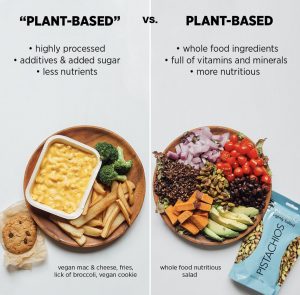Dietitian-Approved Sugar Free Sauces for Clean Eating Success
Dietitian-Approved Sugar Free Sauces for Clean Eating Success
Blog Article
Everything About Healthy And Balanced Food: Benefits of Checking Out Plant Based Options
The conversation surrounding plant-based diet plans has actually gotten significant focus in recent times. Many individuals are exploring the prospective health advantages, dietary benefits, and ecological impacts related to these dietary selections. As individuals come to be a lot more mindful of their food's impact on wellness and sustainability, questions arise regarding the usefulness of taking on such a lifestyle. What certain modifications can one expect, and how might these selections reshape not only individual health yet also the earth's future?
Recognizing Plant-Based Diets
Although lots of people link plant-based diets mainly with vegetarianism or veganism, these diet plans can include a vast array of eating patterns that focus on entire, minimally processed plant foods. Such diets commonly include fruits, veggies, whole grains, vegetables, nuts, and seeds, while eliminating or limiting animal products. This versatility permits people to tailor their dietary choices according to personal preferences and nutritional needs. Some might embrace a largely plant-based diet plan while still sometimes consuming meat or milk, commonly described as a flexitarian strategy. The focus stays on incorporating more plant foods, which can cause a varied array of tastes and meals. Understanding these different analyses of plant-based eating is crucial for appreciating its access and allure in modern food culture.
Health And Wellness Benefits of Plant-Based Foods
The health advantages of plant-based foods are considerable, providing a nutrient thickness advantage that supports total wellness. Study suggests that these foods can boost heart wellness and play a necessary role in effective weight monitoring. By including extra plant-based choices, people might boost their dietary options and advertise long-lasting health.
Nutrient Density Benefit
Nutrient density plays an essential role in the health and wellness advantages of plant-based foods, making them a compelling choice for those seeking a balanced diet regimen. Plant-based foods, such as fruits, veggies, legumes, nuts, and whole grains, are typically abundant in vital vitamins, minerals, and anti-oxidants while being lower in calories. This high nutrient density allows people to eat less calories while still fulfilling their dietary needs. Additionally, these foods are packed with nutritional fiber, advertising digestion health and aiding in weight monitoring. By including nutrient-dense plant-based choices, consumers can boost their general health and wellness, support their body immune systems, and minimize the risk of persistent illness. Ultimately, the nutrient thickness of plant-based foods highlights their significance in a health-conscious lifestyle.
Heart Wellness Enhancement

Weight Administration Support
In enhancement to advertising heart health, a plant-based diet can substantially help in weight management. This nutritional method stresses whole foods such as fruits, veggies, vegetables, nuts, and entire grains, which are normally reduced in calories and higher in fiber contrasted to animal-based products. The high fiber web content helps raise satiety, lowering overall calorie consumption. Plant-based diet regimens are frequently abundant in crucial nutrients while reduced in unhealthy fats, making it much easier to keep a healthy weight. Research study shows that individuals who take on a plant-based lifestyle tend to have reduced body mass indexes (BMIs) and experience even more effective weight-loss contrasted to those that consume meat-heavy diet plans. Accepting plant-based alternatives is a critical choice for effective weight administration.
Nutritional Value of Plant-Based Components
Plant-based active ingredients are abundant in essential nutrients, providing a varied selection of vitamins, minerals, and antioxidants that add to total wellness. A contrast of protein sources reveals that while animal items are typically viewed as exceptional, lots of plant-based alternatives give adequate healthy protein and various other valuable substances. Comprehending the nutritional worth of these active ingredients can aid people make informed nutritional choices.
Vital Nutrients in Plants
Nutrient-rich active ingredients located in plants offer a varied selection of essential vitamins and minerals that add significantly to overall wellness. These components are rich in vitamins A, C, and K, which sustain immune feature, vision, and blood clotting, respectively. On top of that, plants provide crucial minerals such as potassium, magnesium, and calcium, crucial for heart wellness, muscular tissue feature, and bone toughness. The existence of fiber in plant-based foods help food digestion and advertises a healthy gut microbiome. Anti-oxidants, located generously in vegetables and fruits, help battle oxidative tension and minimize inflammation. Lots of plant foods are reduced in calories yet high in nutrients, making them an exceptional selection for those seeking to maintain a healthy and balanced weight while ensuring excellent nutrient consumption.

Comparing Healthy Protein Sources
Protein sources vary significantly in their dietary profiles, with plant-based components using unique benefits. Unlike animal healthy proteins, which typically consist of saturated fats and cholesterol, plant healthy proteins often tend to be lower in these undesirable components. Legumes, nuts, seeds, and entire grains are abundant in necessary you could check here amino acids, fiber, vitamins, and minerals. Lentils provide high healthy protein material together with significant iron and folate, while quinoa is a complete healthy protein, providing all 9 crucial amino acids. In addition, plant-based healthy proteins are often come with by antioxidants and phytochemicals that sustain total health. The change to plant-based protein sources not just enhances dietary intake but additionally lines up with sustainable nutritional practices, lowering ecological impact and advertising long-term health and wellness advantages.
Ecological Impact of Plant-Based Consuming
As awareness of environment modification grows, several individuals are discovering sustainable nutritional selections that can significantly decrease their environmental impact. Plant-based eating has become a significant contributor to reducing greenhouse gas emissions, which are primarily related to livestock manufacturing. The farming of fruits, beans, veggies, and grains commonly calls for fewer sources, such as water and land, contrasted to pet farming. Additionally, plant-based diet regimens can lead to reduced logging, as much less land is needed for grazing livestock or growing animal feed. By changing in the direction of plant-based alternatives, consumers can support biodiversity and advertise much healthier ecosystems. On the whole, embracing plant-based eating not only advantages individual health and wellness but additionally represents a crucial action towards ecological sustainability and preservation initiatives.
Conquering Common Misconceptions
While several individuals acknowledge the advantages of a plant-based diet plan, a number of false impressions commonly deter them from fully embracing this lifestyle. A common belief is that plant-based diet plans lack adequate protein; however, countless plant resources, such as beans, nuts, and tofu, give enough healthy protein. In addition, some think that this diet regimen is costly, when actually, staples like beans, rice, and seasonal vegetables can be quite cost effective. One more false impression is that plant-based eating is overly limiting, whereas it really provides a diverse selection of flavors and foods. Finally, several stress that a plant-based diet plan may bring about deficiencies, yet with proper preparation, individuals can obtain all necessary nutrients, consisting of minerals and vitamins, while delighting in a wide selection of tasty meals.
Tips for Transitioning to a Plant-Based Way of living
Making the shift to a plant-based way of living can be an enriching experience, though it usually needs some guidance to navigate the first modifications. Initially, individuals are motivated to begin slowly, incorporating more fruits, veggies, legumes, and entire grains right into their meals while minimizing meat and dairy usage. Meal planning is crucial; preparing a weekly menu can aid ease the change and stop final harmful selections. Discovering brand-new dishes and cooking approaches can also preserve and improve the experience exhilaration concerning plant-based consuming. In addition, signing up with support system or neighborhoods can give motivation and share important ideas. Lastly, remaining notified concerning nourishment warranties well balanced dishes, preventing deficiencies while fostering a healthy, rewarding plant-based lifestyle.
Delicious Plant-Based Meal Ideas
Discovering delicious plant-based dish concepts can influence people to embrace a much more nourishing diet. One prominent alternative is a hearty quinoa salad, including cherry tomatoes, cucumber, and a vibrant lemon-tahini dressing. One more fave is a savory lentil stew, packed with carrots, celery, and great smelling herbs, ideal for a calming supper. For breakfast, overnight oats made with almond milk, chia seeds, and covered with fresh berries give a nutritious begin to the day. In addition, a vibrant vegetable stir-fry with tofu and a range of vibrant veggies can be a fast yet pleasing meal. Luscious avocado toast on whole-grain bread, sprinkled with seeds and spices, provides a basic yet flavorful snack. These dishes display the variety and splendor of plant-based consuming.

Regularly Asked Questions
Can a Plant-Based Diet Regimen Provide Sufficient Healthy Protein?
The concern of whether a plant-based diet regimen can give enough reference healthy protein prevails. Various resources, including legumes, nuts, seeds, and entire grains, can satisfy healthy protein requires properly, sustaining a healthy and balanced diet regimen for individuals.
Are Plant-Based Diet Regimens Appropriate for Children?
The viability of plant-based diets for youngsters depends upon mindful planning. Adequate nutrients need to be guaranteed, consisting of healthy proteins, minerals, and vitamins. With appropriate assistance, such diet regimens can sustain healthy development and growth in children.
Just how Do I Dine Out on a Plant-Based Diet regimen?
Eating in restaurants on a plant-based diet plan entails seeking dining establishments with diverse food selections, asking for adjustments, and discovering vegan-friendly options. Preparation in advance and communicating dietary choices can enhance the dining experience while preserving nutritional choices.
What Prevail Irritants in Plant-Based Foods?
Common allergens in plant-based foods consist of soy, gluten, nuts, and seeds - Sugar Free Sauces. People following a plant-based diet should know these allergens and review tags thoroughly to prevent damaging responses and guarantee safe usage
Can Plant-Based Diets Aid With Weight-loss?
Study shows that taking on a plant-based diet may help with weight management as a result of its typically lower calorie density and higher fiber content. This combination can enhance satiety, helping individuals manage their caloric intake effectively. Numerous people associate plant-based diets mainly with vegetarianism or veganism, these diets can encompass a wide range of consuming patterns that focus on entire, minimally refined plant foods. Nutrient density plays a vital function in the health benefits of plant-based foods, making them an engaging selection for those looking for a balanced diet plan. Plant-based diets have been revealed to markedly boost heart wellness, as they usually have aspects that sustain cardiovascular browse around this web-site function. In enhancement to promoting heart health, a plant-based diet regimen can substantially help in weight administration. A common idea is that plant-based diet regimens lack sufficient healthy protein; nevertheless, various plant sources, such as beans, nuts, and tofu, supply sufficient protein.
Report this page